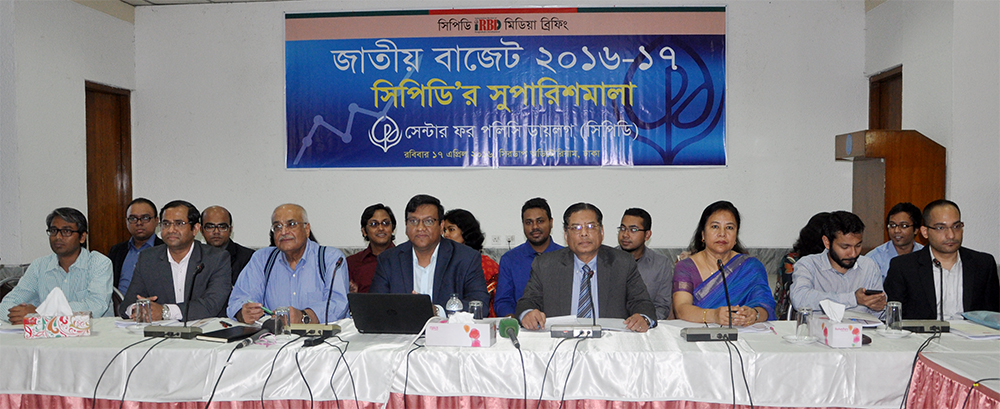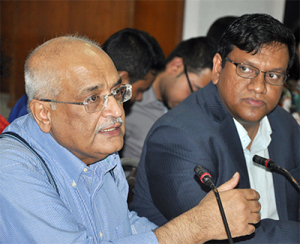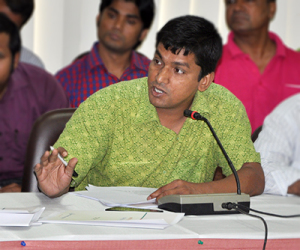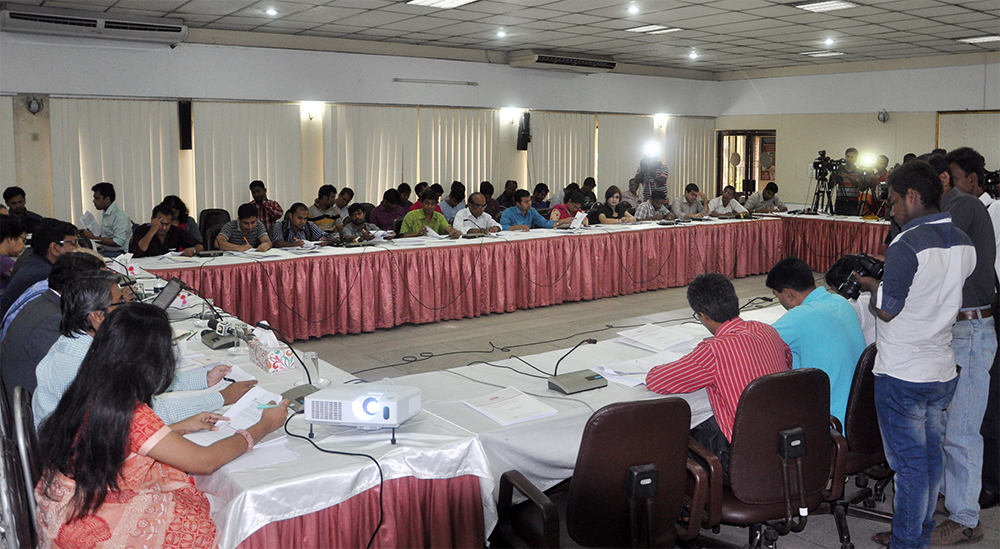
The gaps between fiscal projection and actual implementation are being widened every year. Between FY2009 and FY2016, the gaps have increased for almost all major components of the fiscal framework where the net foreign borrowing is the weakest, followed by ADP and revenue mobilisation. A qualitative improvement of fiscal and budgetary framework is highly needed to address these gaps for attaining and sustaining the projected 7.05 per cent economic growth.
Such observations emerged at a CPD media briefing where “Recommendations for the National Budget FY2016-17” and a report on the State of the Bangladesh Economy in FY2015-16 (Second Reading) were released. The reports were prepared as part of CPD’s Independent Review of Bangladesh’s Development (IRBD) programme. The event was held at CIRDAP Auditorium, Dhaka on Sunday 17 April 2016.
CPD Executive Director Professor Mustafizur Rahman mentioned that the analysis in the report was focused on macroeconomic backdrop in the run-up to the upcoming National Budget, feasibility of government’s estimation on 7.05 per cent GDP growth, implications of sustainable Development Goals (SDGs) and global economic challenges. The analysis also considered the recommendations drawn from the CPD pre-budget dialogue in Bogra on development of small and medium enterprises (SMEs), noted Professor Rahman.
 While presenting the report CPD Research Fellow Mr Towfiqul Islam Khan mentioned that the macroeconomic conditions in FY2016 was stable due to low inflation, steady exchange rate regime and resilient export sector performance. He, however, expressed concerns about the persistent tension as regards public expenditure leakages, low revenue growth, lack of tax compliance, weak governance, inertia in implementation of reform and low private and public investment. Besides, emerging issues such as weaknesses in financial and capital market, feeble supervision of the central bank, global economic slowdown and recent financial security concerns also posed threat to the national economy, added Mr Khan.
While presenting the report CPD Research Fellow Mr Towfiqul Islam Khan mentioned that the macroeconomic conditions in FY2016 was stable due to low inflation, steady exchange rate regime and resilient export sector performance. He, however, expressed concerns about the persistent tension as regards public expenditure leakages, low revenue growth, lack of tax compliance, weak governance, inertia in implementation of reform and low private and public investment. Besides, emerging issues such as weaknesses in financial and capital market, feeble supervision of the central bank, global economic slowdown and recent financial security concerns also posed threat to the national economy, added Mr Khan.
Regarding the government’s estimation of 7.05 per cent GDP growth, Mr Khan observed that it was largely driven by the salary rise of public servants and this high GDP growth did not match with other macroeconomic correlates. He mentioned about income tax collection which was the lowest in the last 14 years. Private investment slowed down and employment generation also did not pick up, he added.

Mr Khan presented the recommendations for National Budget of FY17 under six broad categories – fiscal framework, revenue mobilisation, public expenditure, financing of budget deficit, fiscal measures, and economic reforms and transparency in budgetary system. Regarding the persistent gaps in targets and achievements of various fiscal components, he suggested to prepare the National Budget by accepting current reality, and setting moderately ambitious targets and putting more effort towards achieving the target. In this connection he also mentioned that the Public Accounts Committee and the national parliament should undertake an in-depth scrutiny of actual implementation of the national budget.
To accelerate the growth in revenue mobilisation Mr Khan emphasised on proper implementation of Financial Reporting Act and digitisation of this process by introducing Advance Income Tax collection system.
CPD Distinguished Fellow Dr Debapriya Bhattacharya said that the size of the budget is actually not being increased compared to the extent of expansion of the national economy. He mentioned about depressed demand in the economy and suggested to invest more in the social sector for increasing income. Dr Bhattacharya also noted that there should be more transparency in the investment and the expenditure in the defence budget.
According to a survey a minimum of fifty per cent registered tax-payers are not paying taxes, mentioned Dr Bhattacharya which is a major concern. He suggested to implement strict policies on tax evasion and design strategies to add more new tax-payers. Proper framework and coordination among government agencies needed to increase national revenue through tax collection, he observed.

Regarding the theft in Bangladesh Bank Dr Debapriya noted that this issue should have been discussed in the Parliamentary Standing Committee on Ministry of Finance, in the Cabinet and in sessions at the National Parliament.
Ms Anisatul Fatema Yousuf, Director, Dialogue and Communication, CPD Additional Research Director Dr Khondaker Golam Moazzem and CPD researchers were also present at the briefing.
The presentations and deliberations were followed by a Q&A session with the journalists.

